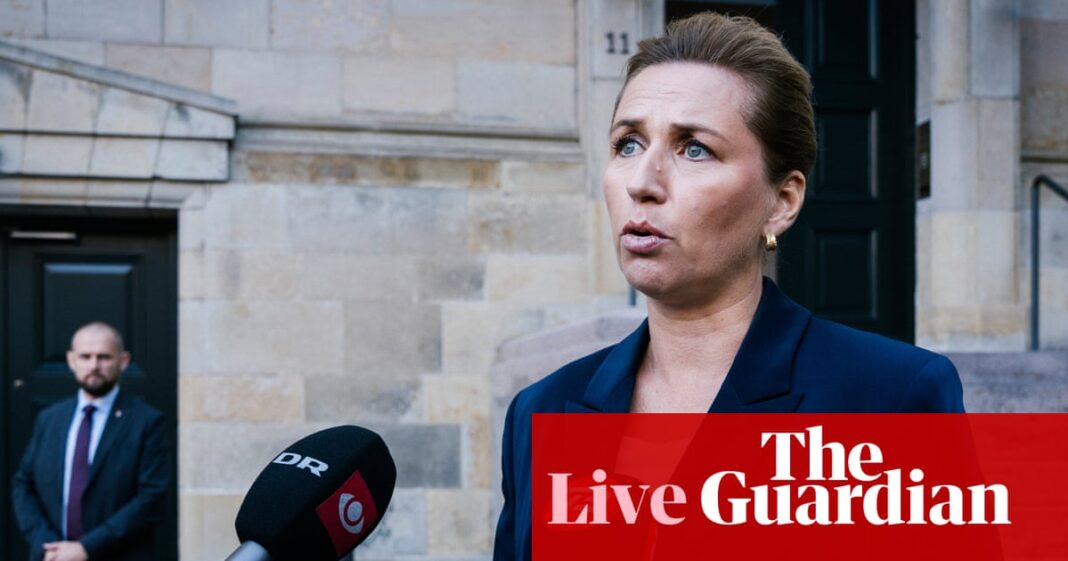EU countries and Ukraine hold talks on ‘drone wall’ to counter growing threat
Numerous European countries are holding talks this afternoon on the bloc’s plans for “a drone wall” to counter growing threat of incursions from Russia or other actors.
The issue is seen as increasingly urgent after recent Russian drone incursions into Lithuania, Poland and Romania, and recent run of so far unattributed drone sightings over Denmark.
Bulgaria, Denmark, Estonia, Finland, Latvia, Lithuania, Poland, Romania, Slovakia, and Ukraine are all taking part in discussions.
The talks are led by EU defence commissioner Andrius Kubilius, with Nato also involved “at the technical level.”
Key events
Russia has ‘ill intentions towards whole world,’ Polish PM warns
Polish prime minister Donald Tusk warned that “Russia has ill intentions towards the whole world” as he spoke about the need for European allies to remain united and vigilant in the face of Moscow’s increasingly aggressive stance.
“European allies have never been so united… we need to be vigilant. Russia has ill intentions towards the whole world, and those who border with it are the first to feel it,” Tusk told reporters when asked about recent drone incidents, Reuters reported.
Denmark briefs European ministers on drone sightings as part of drone wall talks
Danish defence minister Troels Lund Poulsen briefed European ministers on the recent drone sightings over Denmark as part of broader discussions on the so-called “drone wall” (13:07), his ministry said.
During the meeting, the ministers from 10 countries, joined by the EU’s top diplomat Kaja Kallas and EU defence commissioner Andrius Kubilius, discussed “a possible new EU initiative aimed at supporting joint European capacity building in the field of drones.”
The attendees agreed that “a European collaboration on the drone wall could strengthen Europe’s defence,” the ministry said, adding that there was a consensus that all plans should be “accelerated” to meet the new challenges.
We should also hear from Kubilius in hte next half hour (13:46).
EU defence commissioner to give update after drone summit
It looks like we are going to get an update after the EU drone meeting this afternoon.
The EU’s EbS service has just listed a press conference with the EU’s defence commissioner, Andrius Kubilius, and the Finnish defence minister, Antti Häkkänen for 2.45pm (1.45pm BST).
Romania looks to partner with Ukraine on drones production using EU funds
Meanwhile, Romaina suggested it could partner with Ukraine to build drones under a new European Union defence funding mechanism, noting that it will be at least seven years before the country has a multi-layered air defence system, a government source told Reuters.
“We need more air defences, nobody has them,” a Romanian government defence source told Reuters.
“Until then, defence will be asymmetrical with huge anti-aircraft costs which could only be covered on a Nato level.“
The source says Romania was in talks with Ukraine, whose drone technology has been “battle tested at large scale” to produce drones in a project to be funded via the EU’s SAFE rearmament initiative.
Romania will have €16.6bn ($19.4bn) available under EU’s SAFE.
Romanian air defences currently include F-16 fighter jets, Patriot systems, Lockheed Martin’s HIMARS rocket launchers, short-range South Korean surface-to-air Chiron missiles and German anti-aircraft Gepard guns.
EU countries and Ukraine hold talks on ‘drone wall’ to counter growing threat
Numerous European countries are holding talks this afternoon on the bloc’s plans for “a drone wall” to counter growing threat of incursions from Russia or other actors.
The issue is seen as increasingly urgent after recent Russian drone incursions into Lithuania, Poland and Romania, and recent run of so far unattributed drone sightings over Denmark.
Bulgaria, Denmark, Estonia, Finland, Latvia, Lithuania, Poland, Romania, Slovakia, and Ukraine are all taking part in discussions.
The talks are led by EU defence commissioner Andrius Kubilius, with Nato also involved “at the technical level.”
European broadcasters to vote on expelling Israel from Eurovision 2026
Philip Oltermann
European culture editor
Meanwhile, the European Broadcasting Union has confirmed it will hold an online vote in November that could see the Israeli broadcaster Kan expelled from next year’s Eurovision song contest.
In a letter sent to participating broadcasters on Thursday, the EBU president, Delphine Ernotte Cunci, wrote there was an “unprecedented diversity of views” on Israel’s participation in Eurovision, and the issue required “a broader democratic basis”.
In a statement, the EBU said:
“We can confirm that a letter has been sent from the executive board of the European Broadcasting Union to directors general of all our members informing them that a vote on participation in the Eurovision song contest 2026 will take place at an extraordinary meeting of the EBU’s general assembly to be held online in early November.”
The decision comes after several European broadcasters, including those from Spain, the Netherlands, Ireland, Iceland and Slovenia, threatened to boycott the next edition of the world’s largest live music event if Israel was allowed to take part.
Trump’s threat of tariffs on pharmaceuticals triggers fresh uncertainty in Europe

Lisa O’Carroll
Donald Trump’s overnight threat to impose 100% tariffs on pharmaceuticals from companies not based in the US has been met with fresh uncertainty across Europe.
The Germans and the EU wide trade body have expressed concern while Ireland and Brussels says it remains confident that the 15% tariff rate agreed in July will apply to European drugs exported to the US.
The threat also brings fresh threats to exports from the UK, which is still waiting to seal a deal delivering Trump’s pledge to give it “preferential treatment” promised as far back as 8 May, could be snared by any new tariffs.
The European Federation of Pharmaceutical Industries and Associations said “urgent discussions” were needed to clarify Trump’s intentions reiterating its position that tariffs on medicines could “increase costs, disrupt supply chains and prevent patients from getting life saving treatments”.
Nathalie Moll, director general, EFPIA said:
“The EU and US already have a trade agreement in place; urgent discussions are needed on how to avoid any tariffs on medicines that harm patients in the EU and the US.”
Germany’s VFA trade association said on Friday the US deal could hit Germany-based pharmaceutical businesses hard and would violate previous transatlantic trade agreements. Around 25% of Germany pharma exports go to the US, worth about €27bn in 2024, it added.
Ireland and Germany are two of the three EU countries with surplus trading relationships with the US and both large pharma industries.
Ireland’s deputy prime minister Simon Harris said the government would be “studying the impact” of the announcement but stressed that the joint statement on 21 August about the EU US tariff deal “made absolutely clear that any new tariffs announced by the US on pharmaceuticals under its Section 232 investigation would be capped at 15% for pharma products being exported by the EU.”
EU trade spokesperson Olof Gill confirmed this was also the view in Brussels: “This clear all-inclusive 15% tariff ceiling for EU exports represents an insurance policy that no higher tariffs will emerge for European economic operators”.
The new tariff threat comes just days after the US also opened a section 232 investigation into medical devices that can include anything from stents for the heart to prosthetic hips, X-ray machines and pacemakers.
Meanwhile, the UK government said it was pressing for clarification over Donald Trump’s threat to impose new 100% tariff on pharma imports.
Trump promised the UK “preferential treatment” on pharma tariffs as far back as May but has yet to deliver on the pledge.”
“We know this will be concerning for industry, which is why we’ve been actively engaging with the US and will continue to do so over the coming days,” a British government spokesperson said.
“Sectors such as pharmaceuticals are critical to our economy… so we will continue to press the US for outcomes that reflect the strength of our relationship and deliver real benefits for UK industry.”
Germany’s Merz backs proposals for reparations loan to Ukraine secured against Russian frozen assets

Jennifer Rankin
in Brussels
The German chancellor, Friedrich Merz, has thrown his weight behind proposals for a loan for Ukraine secured against billions of Russian assets frozen in the EU.
In a significant intervention that could open the door to massive funding for Ukraine, the German chancellor said “a new impetus” was needed to change Russia’s calculations.
Writing in the Financial Times, he proposed an interest-free EU loan of €140bn to Ukraine that would ultimately be repaid by Russia, once Moscow has paid reparations to Kyiv.
France, Germany and Belgium, where €183bn of Russian central bank assets are frozen at Brussels-based Euroclear, have long resisted calls from central and eastern European countries to seize Russian funds that were immobilised soon after the full-scale invasion of Ukraine.
To break the deadlock, the European Commission president Ursula von der Leyen earlier this month proposed a reparations loan to Ukraine secured against the Russian billions, which would remain untouched. Ukraine would only pay back the loan once Russia pays reparations for the colossal damage inflicted by more than 1,300 days of war.
Merz wrote that Germany remained cautious on confiscating the Russian central bank assets “with good reason” citing international law and the euro’s role as a reserve currency, but suggested these issues could be circumvented without affecting property rights.
The chancellor said he would discuss the plans with EU leaders next week, with the aim of getting an agreement on a “legally secure” financial instrument by an EU summit at the end of October.
Merz wrote:
“In recent years, we have often played it by ear. Now I am advocating the mobilisation of financial resources on a scale that will secure Ukraine’s military resilience for several years.”
He stressed that the funds should be used solely to fund Ukraine’s defence, not general spending. Other political leaders have argued Russia’s frozen asset should pay for the ever-growing cost of rebuilding Ukraine.
Merz also suggested the plan could be agreed by a large majority of EU member states, if unanimity was not possible, suggesting a way round a possible Hungarian veto.
Germany’s intervention is significant, but other member states will need to be convinced. Belgium has expressed scepticism about the reparations loan idea, while France has previously voiced opposition to proposals to seize the assets.
The Belgian and French governments both hold stakes in Euroclear and are concerned about any action against the Russian assets that could trigger legal cases against the Brussels-based financial institution and endanger the status of the euro as a reserve currency.
Danish defence minister concedes response to drones was at times too slow
Danish defence minister Troels Lund Poulsen said the police and the armed forces have been at times slow in their response to drone sightings this week, but insisted they “have improved and picked up the pace” and there was no basis for harsh criticism of the authorities.
Speaking on morning TV show Go’ Morgen Danmark on TV2, he said: “Are we perfect? No. Can we do more? Yes,” TV2 reported.
He admitted that while Denmark has the technology needed to tackle drones, it “hasn’t worked well enough” and needs to be improved.
He also disclosed that Denmark obtained some visual imagery of the drones, which could help with identifying the models seen in Danish airspace and who could be behind these incidents.
Morning opening: Drones are not going away anytime soon

Jakub Krupa
Airspace over the Danish city of Aalborg was briefly closed again last night after unconfirmed reports of drone sightings. While no drones were eventually found, it shows how Denmark is on the edge after repeated incidents this week.
Danish prime minister Mette Frederiksen conceded earlier that “there may be more to come,” as she laid bare the challenge these hybrid attacks pose for the country in a rare TV address.
She conceded that the recent events showed “vulnerabilities” in Denmark’s critical infrastructure, but urged citizens not to give in to “insecurity and division” they were meant to create.
“One time it might be drones; another – cyber-attacks, what we call disinformation, influencing elections or conspiracy theories you read online. But no matter what method we use, the goal is the same: they want to destabilise our society and they want us to no longer trust out authorities,” she warned.
I consider it a new reality that Denmark and Europe are under more violent and frequent hybrid attacks.
In a stark warning, she conceded that Europeans are likely to experience more sabotage and attacks, including on undersea cables or “direct attacks on European democracies, as we are now seeing in the small country of Moldova” which holds a key election this weekend.
As other officials before her, Frederiksen steered clear of formally assigning responsibility for the drone sightings to any particular actor, but she said “we can at least state that there is primarily one country that poses a threat to Europe’s security, and that is Russia.”
On Friday, Danish officials will join nine other countries, including Ukraine, for talks convened by the EU about the so-called “drone wall” that is meant to help countries primarily on the Eastern flank of the bloc to defend themselves from the threat from the East.
I will bring you all the key updates here.
It’s Friday, 26 September 2025, it’s Jakub Krupa here, and this is Europe Live.
Good morning.





